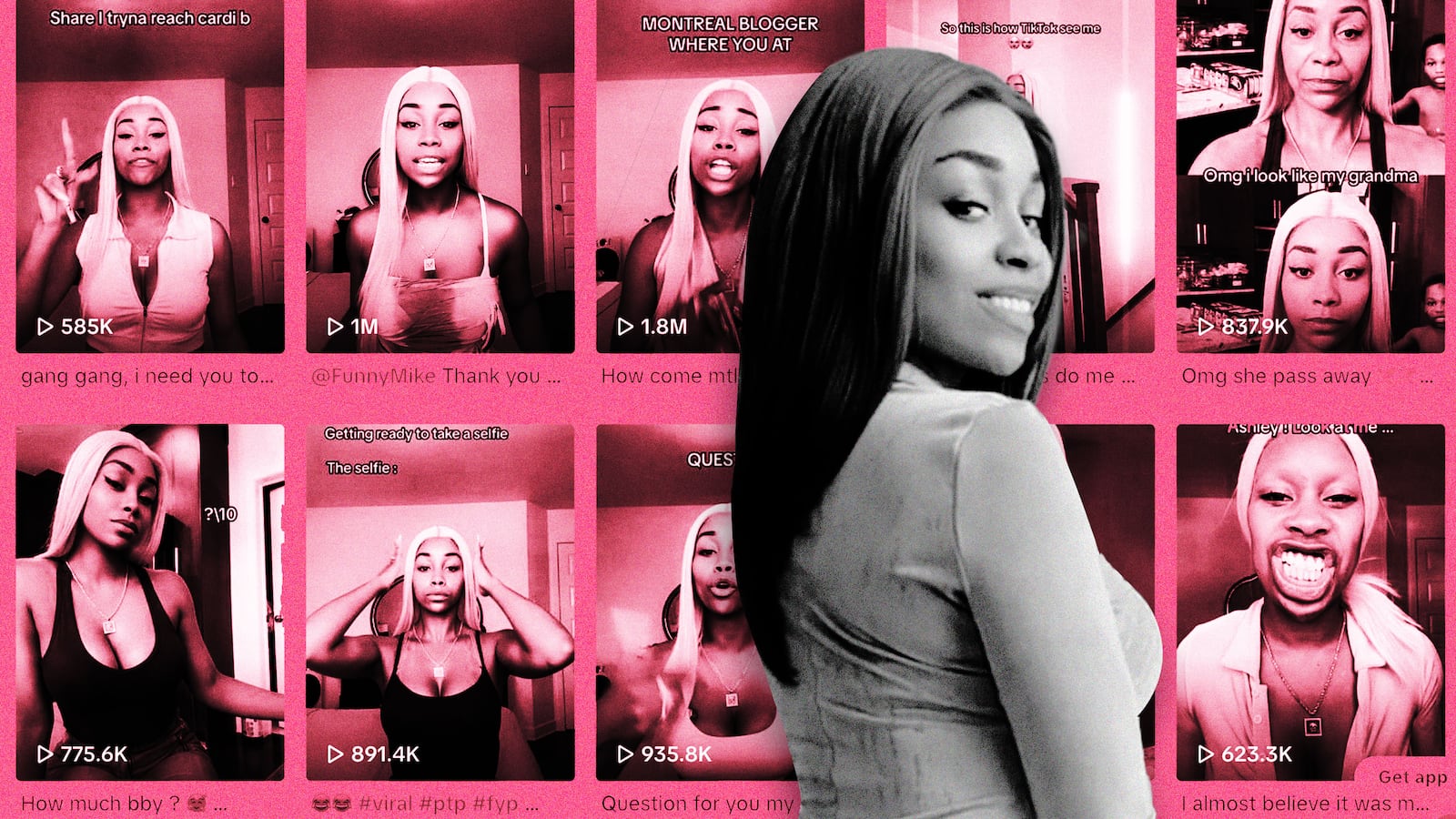The woman in the video has bleached-blonde hair, vacant eyes, and poreless skin that glows with the help of multiple filters. When she speaks, it is in an endless stream of animal sounds, nonsensical phrases like “Ice cream, so good!” and an eerily realistic imitation of the sound of a balloon being popped. At first glance, it is hard to tell if she is actually human.
This is the point. The woman in the video, who goes by the screen name Pinky Doll, is an NPC streamer, a real person who makes money imitating a video game character imitating a real person. (The acronym NPC stands for “non-playable character”—the background actors in video games not controlled by the players themselves.)
The world of NPC streamers was thrust into the limelight recently when videos of Pinky Doll went viral on Twitter. Removed from her devoted fan base on TikTok, the creator’s strange mannerisms and bizarre utterings spurred mass confusion and more than a few diatribes about the state of the modern world. The fact that she was also objectively attractive made the discourse irresistible, and soon, videos of other creators were making the rounds, too.
“I don’t even think there’s a Bible verse to help us deal with this,” one Twitter user wrote. “We’re in unchartered territory.”
“These ‘npc’ streamers are going to destroy an entire generation of children,” another user tweeted about a different streamer.
For something so confusing, the basics of NPC streaming are simple. Creators, mostly women, dress up like stereotypical video game versions of a hot girl and stream live from their homes. Viewers interact by buying them “gifts,” which show up as emojis on their screen. The creators have a standardized response to each emoji—for example, a slurping noise and “ice cream, so good,” for an ice cream cone—which they perform every time that gift is sent.
What makes the whole thing so bizarrely captivating is the speed at which they perform them, and the robotic reliability with which they perform the sounds the same way, time after time. In between, they also adopt the empty affectations of a video game character not currently in use, bobbing their heads and waving their hands like a Sim trapped in a slow-loading computer. (PinkyDoll does not actually wave her hands; they are usually occupied by her hair straightener, which she uses to pop popcorn kernels one at a time.)
To understand why this kind of content exists, look no further than the Instagram accounts for PinkyDoll and other popular NPC streamers like Cherry Crush. Both post overly sexual photos, often dressed as fantasy characters, and link to their OnlyFans pages. (PinkyDoll’s advertises a “FREE SEX TAPE ONCE YOU SUBSCRIBE.”) NPC streaming is a fetish, and the content exists for people who find the idea of controlling a human as you would a videogame character sexually arousing.
When the sexual nature of the videos was revealed, it only added to the online debate, where some saw the content as misogynistic and dehumanizing and others saw it as a clever way of making quick cash.
“i held off on saying this because im not the most eloquent on feminist thought but; these ‘npc fetishes’ seem to be built upon the stripping of free will,” wrote one Twitter user with the handle @nintendobong. “they’re just a female presenting robot, they can’t say no.”
“She’s pretty & her accent/voice is very soothing. She’s making bank & I’m here for it,” countered TV writer Franchesca Ramsey, adding: “She has a little over 200k followers & her lives are going viral so it’s estimated she’s making 5-6 figures.”
Rachel Kowert, a research psychologist who specializes in gaming communities, told The Daily Beast this kind of content plays into basic human desires for connection and control—connection because the creators are responding to their viewers, and control because they are obeying their commands.
She added that there has long been a fascination in the gaming world of pushing the limits with non-playable characters and seeing what the game would allow players to do. But she also said the fact that most of the streamers are women could bolster damaging stereotypes about women in gaming.
“I would say it just further plays into this idea of oversexualized women engaging peripherally in gaming cultures,” she said. “They’re NPCs, not main characters, and it is definitely playing into that.”
“It’s just reinforcing the power dynamic that have always been there,” she added.
Pinky Doll, for her part, didn’t seem to mind the controversy. On Friday, she reposted seven different TikToks of people mimicking her to her Instagram story. On TikTok, she posted a video asking Cardi B for a shoutout. “I know I’m not your girl yet, but you never know,” she said. The video got more than 11,000 likes.




